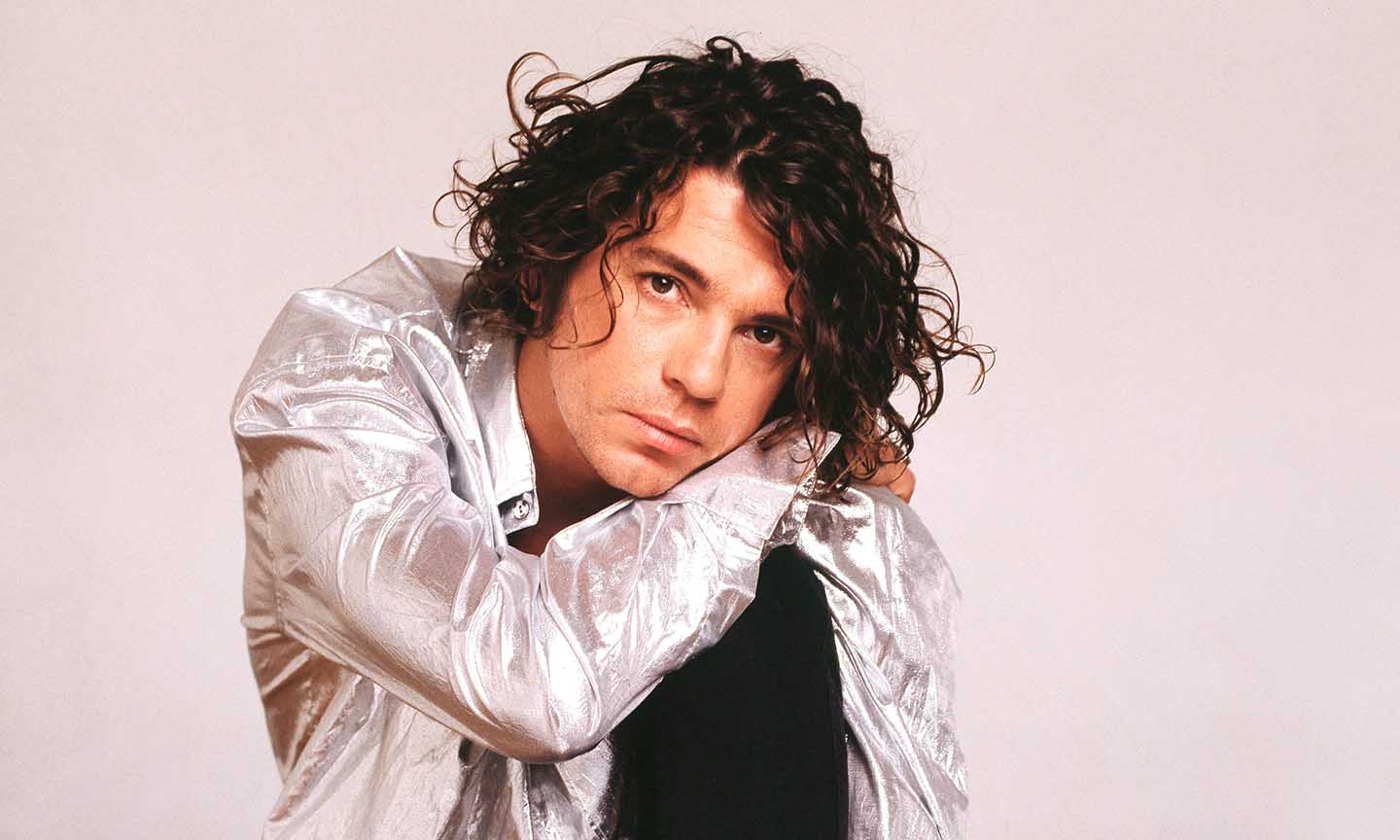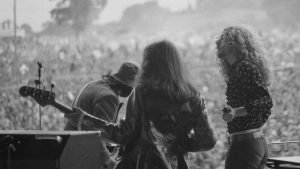A metal badge – of three letters, “S-E-X” – flashing on a leather jacket worn over a bare chest. Tousled, shoulder-length curly hair framing a direct gaze and a weapons-grade pout. A white rat confidently scampering over arms and neck. This was the INXS “Need You Tonight” video and, for most people not already au fait with the Australian rock scene, their first introduction to Michael Hutchence, the band’s frontman and, arguably, rock music’s last true sex god.
“Need You Tonight” and the other singles from 1987’s Kick – “Mystify,” “Never Tear Us Apart,” “New Sensation” and “Devil Inside,” every one a pop classic – exposed Hutchence to global fame and icon status. Though he was a powerful singer, Hutchence’s vocals were also a vector for his other talent: projecting liquid sexuality with his every raw move.
“Others have people who tell them what to wear. I’ve never done that”
Kick exploded at a particularly squeaky-clean, almost neutered time in pop. Though there were notable exceptions – Terence Trent D’Arby’s lithe sensuality and George Michael’s haughty supermodel camp, for instance – the trend was for the unthreatening, epitomized by the Stock Aitken Waterman hit factory. Who would think that Rick Astley or Kylie Minogue had any kind of libido?
Hutchence, by comparison, was a rough’n’tumble musician. He had been with INXS since 1977, and Kick was the group’s sixth album. There was no sense that he was packaged or groomed to appeal to a kiddie demographic. This realism was an important part of his sex appeal: it flowed naturally, uncontained, joyful. “Others have choreographers and people to do their hair, make-up artists, managers who tell them what to wear. I’ve never done that. Ever,” Hutchence said in 1993. The dirty fingernails and visceral sweat weren’t contrived; it was simply all part of Hutchence’s lived experience.
“I learned so much from him”
Live performance was where this all came together in a charged, sticky passion. Hutchence would use the mic stand as a pivot, teasing and gyrating to his audience before giving himself over entirely to them. In the way that Iggy Pop did, Hutchence frequently jumped from the stage into the photographer’s pit to touch flesh with those who adored him. Hutchence’s sexiness wasn’t a standoffish, impossible beauty. It was tactile and warm.
This sense of company – of loyalty – was also there in the very clear camaraderie that existed between Hutchence and the other members of INXS. Like Debbie Harry often did with Blondie, Hutchence resisted entirely being the focal point of INXS: he consistently stressed the importance of the band. INXS even turned down a Rolling Stone cover because the magazine wanted only Hutchence in the photo: “Michael said he didn’t want to be on the cover without the band, and blew it out,” said guitarist Tim Farriss in 1991.
Following Kick, INXS released X, in 1990. The title for its lead single, “Suicide Blonde,” came from a throwaway comment from Hutchence’s new girlfriend about her new artificial hair color. And who was this new girlfriend? Why, only that chaste doll Kylie Minogue. When they began dating, Hutchence’s fellow Australian started to visually luxuriate in her body: edgy minidresses, choppy wigs and knowing stares were now her stock-in-trade, rather than her former bouncy sexlessness. When once asked his hobby, Hutchence laughed and said it was “corrupting Kylie”.
Kylie Minogue, like the many other smart, beautiful ex-girlfriends of Hutchence, stayed close friends with him when the romantic relationship ended. There was, you felt, a basic decency to the man, which Minogue confirmed. “I learned so much from him, and even now he’s teaching me something new,” she said in 1998, following Hutchence’s death. “He’s teaching me how to lose someone I loved.” Hutchence was filled with wanderlust and hedonism, sure, but he was always there for his people, and anxious not to leave anyone feeling low or lonely.
A rare thing
It’s also worth remembering that Michael Hutchence was a rare thing for a rock star – an effective actor. His first film, the independent Dogs In Space, from 1986, depicted the drug-soaked lives of a struggling Melbourne band; it highlighted how connected Hutchence was (and remained, even after the mega worldwide success of Kick) to the underground elements in rock. Nick Cave was a huge influence and the two men were friends; Cave is the godfather to Heavenly Hiraani Tiger Lily, Hutchence’s daughter.
If Dogs In Space was about the gutter, his role in Roger’s Corman’s 1990 film Frankenstein Unbound found Hutchence looking at the stars, as Percy Bysshe Shelley. Hutchence’s performance is mesmerizing. He had no trouble channeling the sex-and-death soul of this particular poet. In fact, Hutchence had once fancied himself as just that. The wistful glances, often spied in early INXS publicity shots, suggest this young boy sensitivity was still a key part of his worldview.
By the time of Hutchence’s final album with INXS, 1997’s Elegantly Wasted, his personal life, rather than his sex-god status, had become the focus for the public. The tabloid press obsessively documented the war between his love, Paula Yates, and her ex-husband, Bob Geldof, including their custody battle. Deeply hurt that he wouldn’t be able to see his children during the tour for Elegantly Wasted, Hutchence was found dead, on November 22, 1997, in a Sydney hotel room. It was the saddest of ends for a man who had been thrilled at fatherhood.
The last of his kind
Michael Hutchence was the last of a certain type of rock star. He had no major imitators. This was partly because no one could really pull it off, but also because that ever-shifting beast, “rock authenticity”, changed its nature in the 90s. It was the introspection of Kurt Cobain and Thom Yorke – performers likely to see sex and love as sites of pain, if they dealt with those themes at all – that became rock music’s default template.
Though Hutchence has been two decades gone, the power of his vintage performances is as strong as ever. Watching the INXS Wembley Stadium show, from 1991, he’s somehow touching every person in that cavernous space. That’s what Hutchence would do; he was a confidant to his audience as well as a fantasy. His like has yet to be seen again, and his loss still hurts.
Listen to the best of INXS on Apple Music and Spotify.




